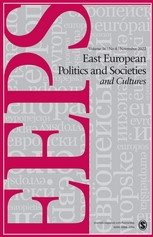Exclusively Our People: Defining Tribalism through the Slovak Case
Exclusively Our People: Defining Tribalism through the Slovak Case
Author(s): Ilana Hartikainen, Zea SzebeniSubject(s): Media studies, Communication studies, Government/Political systems, Politics and communication, ICT Information and Communications Technologies
Published by: SAGE Publications Ltd
Keywords: tribalism; populism; Slovakia; democracy; social media; Facebook;
Summary/Abstract: We define tribalism as a mode of articulation that draws an antagonistic frontier between societal groups. Unlike populism, tribalism does not have a hegemonic character. It articulates groups through a horizontally oriented, shared value system; whereas populism is an essential part of a democratic system, tribalism disregards democracy. To conceptualize tribalism as a separate theoretical frame from populism or (ethno)nationalism, we used discourse theoretical analysis to analyze the Facebook pages of four political party leaders in Slovakia (Marian Kotleba, Krisztián Forró, Igor Matovič, and Boris Kollár). Kotleba’s page showed tribalistic features by articulating an antagonistic divide between “us,” the people, linked by shared values and identities, and anyone not sharing those values, or “them.” His representation of his party’s fight against oppressive forces, combined with their apathetic stance toward democracy, makes his a prime example of a tribalist party. While populism is an ever-expanding area of research and a framework widely used to analyze political entities and events, it is a word often thrown around and thus overused. Tribalism offers an alternative approach to analyze political instances in a national and transnational context in a more nuanced way, and to gain a better understanding of previously overlooked phenomena.
Journal: East European Politics and Societies
- Issue Year: 38/2024
- Issue No: 01
- Page Range: 73-96
- Page Count: 24
- Language: English
- Content File-PDF

